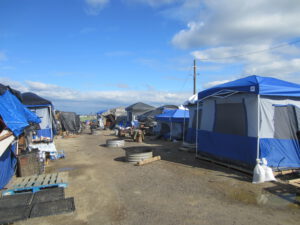
According to Tulare city staff, over the past 10 years there have been 14 homeless deaths with numerous fatalities around Union Pacific Railroad property. During the 18 months that Marc Mondell, Tulare City Manager, has been employed, 4 of the 14 have taken their lives.
This rapid increase encouraged the city to act and they started with the creation of a homeless encampment not far from the rail road tracks where the largest and most dangerous homeless community was living.
Mondell, Josh McDonnell, Assistant City Manager and Jason Glick, Parks & Recreation Director spearheaded the creation of the city run encampment that opened January 25 and got the ball rolling on a future permanent building.
The permanent housing is going in across the street from the temporary encampment currently located on the Hillman Health Campus’s vacant soccer field on the corner of O St. and Walnut in Tulare. The plan for the building is still being drafted but is halfway finished. It is estimated that it will take six months to finish the architectural draft and twelve months to complete construction of the building.
The city run encampment houses approximately 95 people and can expand to include 135-178 in total. McDonnell reported the camp has been slowly reaching that total through the intake of new guests every two weeks.
The city’s first priority was to get as many homeless moved away from the railroad tracks on Inyo and J St as possible. City employees spent time at the camp by the railroad recruiting potential residents and getting their input on what type of tents would be best for them.
“They were included in the process of creating the city run encampment,” said the staffer.
The staff recruited about 70 homeless giving them a spot at the new camp along with a tent and other amenities. The first residents were also enrolled in the Encampment Resolution Fund Program (ERF.) The program pays for, and assigns, each homeless person a social worker who works on finding them permanent housing.
All the ERF funds have been allocated and the city is hoping for a second round of funds in April.
Priority goes to Tulare residents: according to a city employee the encampment has a three page waiting list of homeless from Plaza Park in Visalia and people living along the St. Johns River requesting to move there.
The encampment includes portable toilets, tents, and mobile showers. The site also includes electrical outlets, picnic tables, trash bins, trash receptacles as well as storage facilities for personal items. More recently grills have been installed in the rows between the tents. Guests are allowed to keep 2 pets as long the pets are on leashes or tied near their owner.
David, who has been a resident of the camp through the constant rain said the camp lost about 20 tents in the last storm. The wind caused the tents to buckle and be blown away. Tulare quickly replaced the tents and has since installed a cross bar to help prevent buckling in the future.
Mondell said the staff is very hands off. The occupants are given the resources needed but expected to be independent. They follow a basic “golden rule” as he put it.
Along with these accommodations Glick said guests are offered free food from 3rd party charities. The location also helps emergency services arrive quickly if needed. With food, water, and shelter needs taken care of the clients are able to establish a routine.
According to the camp’s list of rules and regulations, “Tulare Cares provides a Homeless Outreach Team. The homeless outreach team is made up of HALO (Homeless Assistance Liaison Officers) Tulare Code Enforcement Officers and the Tulare Police Department…The team always emphasizes treating the unhoused population with dignity and respect.” Guests should feel safe but it especially helps the guards understand the people’s needs and struggles.
So far there have been minimal issues with the new encampment. Glick noted that guests have given positive feedback about the encampment and have reported feeling safer. The guards socialize and become acquainted with the tenants. This familiarity helps de-escalate conflicts if they are to arrive. Only 5 people have left so far.
The shelter could always use more volunteers and the residents need donations of food, clothing, and toiletries. For more information about donations contact (559) 366-1700.
